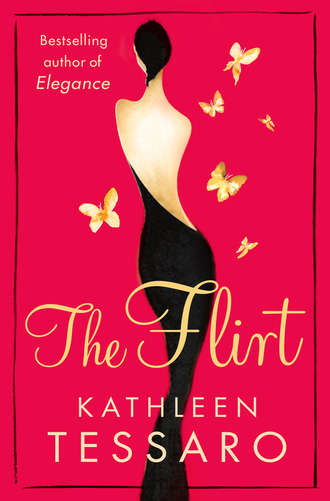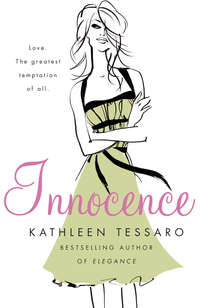
Полная версия
The Flirt
Wiping the lipstick off the woman’s glass, he poured out the rest of the wine. Not a bad year, he thought, settling back.
At least the letter was off, winging its way across London. He was in with a chance. Today, he was scrambling for spare change but tomorrow? Who knows? He popped a crisp into his mouth. After all, it was difficult to keep a Venables-Smythe down.
He made a note of the time on the clock by the front door, then turned to the sports page and checked the cricket score.
Sooner or later, Leticia’s client would leave.
And sooner or later, the Reverend Hardascanbee would have his evil way.
Armenian Plumbers
Leticia closed the door.
Nothing was going to plan today. Hughie was late, the romance novelist turned out to be four foot seven, a size twenty, and obsessed with the colour pink and now she’d have to measure her in the workroom because the plumber was poking about in the bathroom, trying to locate the mysterious leak. He was hammering on something, making the most God-awful noise.
She checked the tea things she’d laid out earlier, running her fingers over the exquisite china cups and saucers. Thin, tangy lemon biscuits, smoky Assam tea, fine white sugar, milk, all neatly arranged on the large silver tray. Turning on a CD of Handel arias, she tried to look serene and composed, taking it back into the main room. ‘Please forgive me!’
The novelist beamed up at her, dressed in a pair of too-tight jeans and a waxed Barbour jacket, smelling of wet dogs and hand lotion. ‘No problem at all!’
‘So,’ Leticia poured a little tea in a cup, checking the colour, ‘you want something with puffball sleeves, is that right? And a train? Are you sure?’
She nodded eagerly. ‘Do you think you can do it?’
‘Well.’ How to break the news to her? ‘It’s not what I would recommend. Why don’t we go for something more…streamlined…more sophisticated?’
The woman’s face fell. Leticia was clearly demolishing a childhood dream.
‘Milk and sugar? That’s not to say it won’t be gorgeous,’ she added temptingly.
‘Excuse me.’
It was the plumber, standing in the doorway, wiping his hands on an old rag. These people had no sense of timing.
‘May I have a word?’
‘Pardon me.’ She eased the novelist into a chair, piling a stack of sketchbooks onto her lap and popping a biscuit in her hand. ‘Have a look through some of these. It will give you some fresh ideas. I won’t be a minute.’
She followed him into the bathroom. ‘Yes? So what exactly is wrong?’
‘How long ago did you have this put in?’
‘Three years ago. Why?’
‘And who did it?’
‘Freelance guys. Armenians. Friends of my godfather’s.’ (‘Friends’ was a euphemism.)
‘So not a proper outfit, is that right?’
She didn’t like all these questions. ‘Well, no. Not as such.
Why?’ She folded her arms across her chest. ‘What has that got to do with anything?’
Sam sighed. ‘I didn’t think it could be done by a legitimate company. Not by the quality of the work. But I wondered for your sake. Then you might have some legal recourse.’
The word ‘legal’ sounded ominous.
‘See this,’ he continued, pointing to the pipes that fed into the freestanding bath. ‘Underneath the floorboards there are places where they’ve been held together with chewing gum and electrical tape. These pipes aren’t even the same width. You’ve got a well of water underneath there that’s rotting the wood. I’m surprised you couldn’t smell it.’
The Armenians had done it at the most amazing price. And so quickly too.
She ran her hand over her eyes. ‘Can you fix it?’
He shook his head. ‘I can fix it but it means tearing up these floorboards, maybe even starting from scratch.’
‘And how expensive will that be?’
‘Hard to say. Twelve hundred?’
‘No!’
‘You can get a second opinion. I mean, another quote. But don’t use it for a couple days. It needs to dry out.’ He began packing up his bag. ‘If you want me to do the work, I can fit you in, but you need to let me know quickly. Here,’ he took a card out of his back pocket. ‘Let me know what you decide.’
‘Thanks,’ she said grimly, leading him through the workshop and opening the back door.
‘By the way’ he stopped on the threshold, looking around, ‘what is it you actually do here?’
‘I design bespoke lingerie.’
‘You’re kidding!’ he laughed.
Leticia straightened. ‘What’s so funny about that?’
‘Nothing. Hey, any chance of coming to a fashion show?’
‘Thank you for coming by’ she said briskly, shutting the door.
Twelve hundred for pipes! Of all the things to have to spend money on! Then she thought of her ever-climbing overdraft. It was all so depressing.
She tossed the card down on the counter, adjusted the music and went back to her client.
This really wasn’t her sphere; she was an artist, after all.
The King of the Tennis Ball
Arnaud Bourgalt du Coudray was the king of the tennis ball. Anyone who ever thought about tennis balls (and there were those who did), couldn’t help but consider the du Coudray Imperial, with its bold mandarin-yellow felt and exceptionally springy rubber core, as everything a tennis ball should and could be.
But the du Coudray Imperial had been Arnaud’s father’s accomplishment. (Actually, it had taken two generations to perfect—one for the felt and another for the springy core.) By the time Arnaud was born, the Imperial was the established tennis ball of champions. And so throughout Arnaud’s privileged life, his mother had followed him around, first when he was too small to get away from her and later, when he was too guilty to try, drilling into him that he would never match his father’s success as a son, a human being or a producer of world-class tennis balls. He might as well give up right now. Which would, of course, be disgustingly lazy.
But Arnaud did not give up. It is a credit to his sheer stubbornness that every year he embarked upon a new scheme to make his mark on du Coudray Industries and increase the already ludicrously large family fortunes.
And year after year, under the cynical eye of Arnaud’s mother, his schemes failed.
There was the rubber tennis dress that never needed to be washed. The coaching racquet that hurled abuse every time a player missed a shot. And the legendary Tennis Caddy, a remote-controlled tennis bag on wheels which premiered at Wimbledon, famously reaching speeds of up to sixty miles an hour. Unfortunately, these were recorded during the men’s finals when one rogue version terrorized a slow-moving ball boy on national television.
But now at long last, Arnaud’s hour had come. The Nemesis All-Pro Sport 2000 tennis shoe was a marvel of engineering, a triumph of fashion design, and a veritable orgasm of shiny lurex, flashing lights and gravity-defying rubber springs. And with Men’s Top Seed Ivaldos Ivaldovaldovich flying in from Croatia to launch it in a special ceremony in Hyde Park, it was certain to fly off the shelves despite its £299 price tag.
Standing in the middle of the vast sporting goods department of Harrods, Arnaud eyed up the competition. This time he had cracked it. None of them—Nike, Reebok, Puma—were a patch on his creation, he noted, smiling with satisfaction. Amateurs, all.
Behind him Jack Pollard, his marketing director, was negotiating an exclusive display with the buyer; gesturing wildly, virtually battering the poor woman into submission with his enthusiasm. But Arnaud, restless, excused himself, wandering alone through the maze of exercise bikes, yoga mats, rowing machines—an endless parade of products aimed at the preservation of youth. How depressing. There was some woman in her fifties trying to balance on a ski machine. ‘It’s too late!’ he wanted to shout at her. ‘Give up!’
Rounding a corner, he came face to face with an older man. The man barred his way, glaring at him. What an old shit, Arnaud thought. He was about to say something when he realized with horror that it was a mirror.
Those were his lined features, his thinning hair, his sagging shoulders. For a moment, he thought he might be sick. Then he turned anxiously to see if anyone else had witnessed his discovery.
He was alone.
Backing away from the mirror, he averted his eyes, moving quickly into another section. Rage, unholy and mountainous, boiled up inside him. The events of the past year had clearly ruined him, draining away his mental, emotional and physical well-being. And he thought of Olivia, of how she had failed him. If only she were a proper, functioning woman, things would be different!
For it is true to say that, while Arnaud hated himself, he despised Olivia even more.
He kept walking, barely noticing where he was going.
Of course he could have plastic surgery but then everyone would know; his insecurity would be revealed for the entire world to see. Besides, it was pathetic; one of his oldest friends, Fabrice, had succumbed and now he looked positively bizarre—tight bits here, saggy bits there—his facial expression was one of permanent surprise. It was impossible to hold a conversation with him without being offended.
It wasn’t a dignified solution. Was there a dignified solution?
More and more, Arnaud began to think not.
He turned a corner into the ski department.
He hated life; hated everything about ageing and being old.
If only he could begin again.
That’s when he saw her.
She was trying on a fur-lined Prada ski jacket, pouting and posing in front of the mirror. Almost six foot tall, with long black hair, a round face and enormous brown eyes, she radiated a languid, almost bored sexuality. Her jeans were skintight, emphasizing to great effect her model’s figure. She couldn’t be more than twenty-four.
Arnaud was mesmerized.
‘I don’t know,’ she sighed, speaking in a thick Russian accent. ‘Is so expensive!’
‘And yet,’ pointed out the sales assistant eagerly, ‘it will never go out of fashion. It’s an investment piece.’
‘Everything goes out of fashion!’ she snorted, turning again to examine her lovely profile with the hood on. ‘Nothing lasts in this world! Nothing.’
Then she caught Arnaud’s eye. In an instant, she recognized him and determined to seize her chance.
‘Isn’t that right?’ she challenged, fixing him with a sultry stare, full of pornographic promise. Then, just as quickly, she removed it.
(Hot, cold, scalding, freezing; here was a girl who knew how to hook a man.)
Arnaud couldn’t believe his luck. This sexy young woman wanted him! In a few seconds she’d managed to obliterate months of self-doubt.
He’d obviously been oversensitive about the business with the mirror.
Leaning back casually against the counter, he dug his hands deep in his pockets, grinning. When he was younger, he’d possessed a pair of captivating dimples; he did his best to flash them now. ‘I think you’re too cynical.’
‘No. I’m a realist. So. What do you think?’ She licked her lips, slowly zipping up the front. ‘I want a man’s opinion.’
He held her gaze. ‘I think that you are too beautiful not to have exactly what you want.’
She laughed, tossing her mane of black hair over her shoulder. (Here’s what I look like in the throes of passion, she signalled.) ‘Easy to say, but hard to do!’
He had a vision of her, writhing above him, dark hair across her bare chest.
Out came his wallet. ‘Allow me.’
Her eyes widened.
‘On one condition, of course,’ he handed his credit card to the stunned assistant, ‘you must allow me to drive you home.’
A Stranger at the Garrick Club
Jonathan Mortimer Esq. of the solicitors Hawes and Dawson, paused at the bottom of the stairs and rubbed his eyes.
It was late.
He’d struggled through another supper with his most important client, Arnaud Bourgalt du Coudray and one of his yes men, Jack Pollard, securing a private dining room at the Garrick Club at short notice. Arnaud had insisted on bringing some Russian escort along. What should’ve been an hour or two at most discussing yet another merger, dragged into three while they groped and pawed one another. It was so tedious; rich people were like toddlers with their constant demands for attention.
Now all he wanted to do was go home. But the thought of climbing the stairs, his wife Amy’s back turned pointedly towards him as he got into bed, made him hesitate.
Why was being married so bloody difficult?
They’d had yet another argument this morning. He couldn’t even remember what set it off—only that it had escalated into dangerous territory too quickly. There was only one scene they played out nowadays. He was unsure exactly what it was about, only that it was bitter and full of tension.
So instead he wandered back into the bar of the Garrick Club and, slumped into one of the decrepit leather armchairs, began working away on his fourth Scotch.
All around him the comforting noises of men acting like men lulled him, tugging away at the frazzled threadbare edges of his soul. That was what gentlemen’s clubs were for; a last refuge from any form of female-ridden reality.
Swallowing a thick, amber shot in one, he reflected on the state of his life. If he’d bought it in a shop, he’d demand a refund immediately; it was clearly not as advertised.
And it was all Amy’s fault.
He remembered the plans they’d made, when there were only two of them, tucked into bed in his Chelsea bachelor pad; the picture Amy painted of a large, comfortable family house filled with song and laughter, like The Sound of Music; the discreet, grateful army of cheerful nannies, demure cleaners, and cheeky au pairs serving delicious meals round the dining table where adults and children would share a quiet hour of civilized conversation…
Then he thought of the mouldly Marmite sandwich and Stickle Bricks he’d discovered wedged into his briefcase this morning by one of the boys. Of the pokey, overpriced house they were all crammed into in the less fashionable environs of South London. Of the sullen Spanish au pair who regularly ate all the ice cream.
This was not that vision.
You only had to look at Amy and she conceived again. Three children under nine and now another one on the way! Of course he loved the children. That wasn’t the issue. The real crime was Amy’s. She’d abandoned him; the delicate, devoted woman he’d married had evaporated early on in the first pregnancy. Overnight she’d been replaced by a wisecracking, middle-aged Shakespearean wet nurse, complete with the matching body of cartoon proportions.
He’d been left to fend for himself; relegated to a marginalized authority figure, endured for his only useful quality—his ability to fund this extravaganza.
It was unfair.
And he was lonely.
He tried to focus on his watch.
Just time for one more drink.
The bar was still quite full, despite the late hour. Jonathan was having trouble attracting the waiter’s attention. He stood up, legs unsteady. Lurching forward, he tumbled straight into a fellow member reading a copy of the Financial Times.
‘Terribly sorry!’ he gushed, trying to rebalance himself, smooth his tie down and uncrumple the man’s paper all at once, all unsuccessfully.
The gentleman smiled, brushing off his exquisitely cut Savile Row suit with quick strokes. He led Jonathan back to his own chair, where he collapsed gratefully.
‘Really I can’t apologize enough.’ Jonathan’s cheeks were flushed from embarrassment and effort. ‘Stupid of me. Clumsy. I’m really terribly, terribly sorry…’ His voice faded. It was all turning into a nightmare. The porter would end up calling him a cab and Amy would have a field day. Consequences stretched out before him, predictable and unavoidable.
He sighed.
The man tilted his silver head to one side, then sat down next to Jonathan and crossed his legs. ‘I hope you’ll forgive me, but it seems to me as if you have a great deal on your mind.’
Jonathan looked up into his still, grey eyes. They were so calm, so friendly, so non-judgemental.
‘Yes,’ he nodded. ‘Yes. You see, I do. I really do.’
The man smiled. ‘It’s very difficult sometimes. No one really understands.’
Jonathan leant forward eagerly, clutching his empty glass. ‘Yes, that’s true!’ he agreed.
‘Just because we’re…’ the stranger paused, ‘men of the world, shall we say? Everyone assumes we can handle things on our own.’ He raised his arm and almost instantly a waiter appeared. ‘May I buy you a drink?’
And in that moment, there seemed to be more kindness than Jonathan had felt in a long time. ‘Thank you,’ he said gratefully. ‘Thank you very much!’
The waiter took their order, moving soundlessly away, and Jonathan settled back into his chair. Almost unconsciously, he checked his watch and frowned.
‘Late?’ the stranger ventured.
Jonathan laughed stiffly. ‘Not yet. No, no. Not yet.’ He was aware of how henpecked he sounded. ‘You see, my wife’s pregnant. Again. Doesn’t like to be alone in the house at night,’ he lied.
‘Ah! Married life!’ The man smiled knowingly.
Jonathan felt the stiffness in his shoulders relax; he smiled too. ‘It should come with a warning, shouldn’t it? Like they put on packets of cigarettes: marriage kills!’ He felt instantly guilty. ‘Or at least, all the best bits die…the sex for starters!’ This time his laugh sounded hollow and forced.
The waiter returned and, armed with a fresh glass of Scotch, Jonathan rallied. ‘I mean, everyone has bad patches, right?’
The man was still.
‘It’s just, my wife has been pregnant for so long! One kid after another…It changes a girl. She’s not the same,’ he added, staring into his glass.
‘Yes, everything changes,’ the man agreed, gently.
It was a simple enough comment, but the man’s voice had a wistful quality. In his drunkenness, Jonathan imagined this stranger understood, with greater subtlety, a whole range of experience none of his other married friends would admit.
‘Thing is,’ Jonathan leant in closer, lowering his voice, ‘I don’t actually fancy her any more!’
There. At last, he’d said it out loud. To a complete stranger, but perhaps that was for the best. He felt a mixture of relief and panic. ‘I mean, I love her. Of course I love her…’
Did he?
Was it love or just habit that kept them together now? A sharp burning sensation filled his chest; the question was too painful even to contemplate.
‘Yes,’ the stranger tilted his head thoughtfully to one side. ‘You see, my view of marriage is that it’s an extremely delicate thing. Resilient, yes. But more like a finely made Swiss watch than, say, a huge, muddy piece of farm equipment. Sometimes, when it’s all come to a grinding halt, what’s really required is a little fine tuning rather than a large, clumsy repair job.’ As he spoke, the man re-crossed his legs. Jonathan was aware of the glossy black sheen of his handmade shoes and the way his dark navy silk socks matched the shade of his pinstripe suit perfectly. Elegant silver cufflinks flashed as he drew his elbows up, pressing the tips of his long fingers against one another. ‘From what you’ve said, it’s possible that both sides are feeling neglected, perhaps a little unappreciated. Does that sound like an accurate appraisal to you?’
He made it sound so light, so normal.
Jonathan nodded. ‘Yes, I suppose so.’
‘These situations can so easily get out of hand. Snowball, so to speak. But,’ he held his finger up promisingly, ‘if one of you were to make an effort, the whole thing could easily be reversed, don’t you think?’
Jonathan imagined a large snowball barrelling towards him, then suddenly swerving, heading in the opposite direction, growing smaller and smaller until it disappeared.
‘Perhaps…’
The man sensed his hesitation. ‘But when a dynamic has been allowed to grow unchecked for so long, one doesn’t always have the emotional resources to make the effort required,’ he concluded.
‘That’s right!’ Jonathan had never heard anyone describe his particular malaise so succinctly or accurately.
‘Yes, yes, of course!’ the man nodded. ‘I’ve seen it a thousand times!’
‘Have you?’ Jonathan leant forward.
‘Absolutely! Don’t despair. This whole difficult chapter of your marriage can be behind you in a week,’ the man assured him breezily. ‘In place of a distant, sullen wife who’s given up on herself, you can have a delightful, confident creature—without the time, expense or distress of resorting to long-drawn-out discussions where intimate details are dragged out in front of third parties.’
‘Really? But what’s to be done?’
The man took something out of his breast pocket; a thin silver card holder. And moving with no particular speed or urgency, he removed a card and handed it to Jonathan. ‘I might be able to help you.’
The card read:
Valentine Charles.
Procurer of Rare Domestic Services.
Satisfaction Absolutely Guaranteed.
111 Half Moon Street
Two days after the advertisement appeared in the Stage, 111 Half Moon Street was inundated with responses and the postman had to ring the bell because all the thick envelopes wouldn’t fit through the letter box.
Valentine Charles couldn’t quite decide if he enjoyed this bit of the proceedings; it was time consuming and exhausting sifting through all the letters, but also thrilling when one happened upon that rare gem. This morning, the deluge had been particularly heavy and as he sat there, in his cashmere dressing gown, with his morning coffee, he looked upon the pile with satisfaction. In there, somewhere, was a budding new apprentice and an answer to the staff difficulties that had plagued him for the past months.
He considered diving straight in but then dismissed the idea. He was a creature of habit and married to the inflexible, set routine of his daily life. One of the pleasures of living by yourself is the privilege of being able to practise, day after day, in whatever order you wish, the rituals that define your tastes and aspirations without any threat of disruption. And at fifty-eight, Valentine was deeply grateful for his solitude.
He had loved, a few times briefly but only once seriously. The love wasn’t returned and so he made peace with all the aspects of single life that many people find so abhorrent. Now he valued them above all else. Over time he’d mutated from a lonely, watchful person into a completely self-sufficient one, treating himself with the same affection a lover would. The older he was the more he realized that few people were given the time and means to be as completely indulged as he was. He hadn’t had to accommodate another human being on any matter of significance for years. He was entirely, unapologetically selfish and grateful for the opportunity to be so. Now, when he thought of the woman who broke his heart (which was rare), he viewed it as a narrow escape.
No, he’d finish his coffee, glance at the crossword, then have his bath. And while he was dressing, his assistant, Flick, would arrive.
Flick had been sent from an agency twelve years ago. She’d turned up, a rather dour middle-aged Irish woman in a beige Marks and Spencer twinset, shortly after her husband died. Her full name was Mary Margaret Flickering, but Valentine had christened her Flick early on. At first she was horrified. But gradually, Mary Margaret Flickering began to fade and Flick took hold. The beige twinset disappeared; her actions became sharper, her tone confident and Valentine learnt the power of re-framing someone. Flick was more daring and resilient than Mary Margaret Flickering had ever been. And she was funnier too. Now she was invaluable to him.








